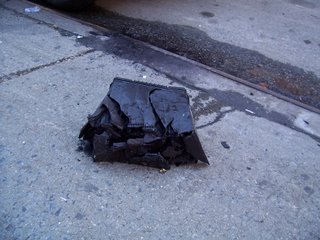Beyond Brutality And Bashing

Smashed Battery Oozing Its Acid Onto West Twentyseventh Street, 2006, artist unknown
Simpleposie asks this question:
What happens to art discourse that leaves out the voices of its own practitioners ie. artists? Well, it turns into something else doesn't it?
Excellent point. Peer review is integral to academic integrity, and it's strange that artists aren't expected to perform this service for one another. Perhaps this is because using the word integrity in a discussion about visual art feels either forced or naive. But why? Does it have to be that way?
To answer Simpleposie's question, art discourse that does not listen to the voices of its own practitioners is discourse about looking at art that other people make. Sometimes that distance and mystery allows for some great cognitive leaps--there are astounding art writers that do not make art.
But looking at art that other people make is a distinctly hands-off experience, and can lead to fluffery and attributing quality where none exists. What is the critic's intellectual stake if he does not have a practice to defend/protect/uplift/explain? Intellectual integrity is a valuable comodity in these moneyed times. The nonartist critic, because of the hands-off nature of his practice, has fewer intellectual moorings and is more likely to be tossed around by all this money and power. More likely to become a pawn.
I was talking to Paddy about this very issue, and she brought up Ben Shahn, who wrote that (Paddy is paraphrasing Shahn here) "the artist critic is more brutal than the critic, because the artist critic would sanction the destruction of work."
This "brutality" could also be called an intellectual stake--a point to defend paired with a decided lack of mysticism about the object itself. Artists who write about other artists are creating located knowledge--they are burning one line between their own practice and another. This takes the discourse out of the market and provides another venue for meaning to be created. This is a bottom-up approach to creating intellectual discourse that depends upon knowing who you are and what your intellectual stake is, what biases it creates, and working with those biases instead of against them.
I'm going to be honest with you. I haven't been writing because I have been thinking about this in terms of words like "brutality" and "bashing." What a reality check! These words send the power of criticism to the forefront, and also assume that this power will be wielded poorly.
And I want to move past that diceyness. Artists should write criticism, and they should listen to Paddy, who writes:
I think the only reason criticism would make an artist jaded or bitter is if it was entirely self-interested. In other words, the point is not simply to revel in the excellence of your own ideas, but to support artists who are doing really interesting things. That's the sort of thing that is really empowering.
I take this to mean that artists should be writing as a part of an intellectual community and not to prove themselves better than others. This can mean arguing, and it can mean thinking someone's art is not very good. But the point is this larger meaning-creation project. Art can mean anything, and right now it mostly means commodity. Whatever else it means is up to us.
And artists who get written about should understand that figuring out what it all means often precludes cheerleading--that there's plenty of that already. That criticism can be generous without being indulgent or understanding, and that they are part of a meaning-creation project that is actually more important than their individual ego...
...and besides, that there's no such thing as bad press.

2 Comments:
Thanks for this series of really thoughtful posts Deborah.
I like this alot.
Post a Comment
<< Home